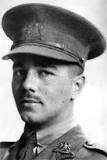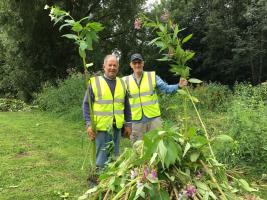Speaker:-Lorna Hickey
Tue, Aug 14th 2018 at 12:45 pm - 2:00 pm
Speaker:-Lorna Hickey Speaking on Wilfred Owen WW1 Poet

Club members please log in for more information.
When I was invited to join Rotary, I was not aware that I would have to give a
talk. The one talk I gave pretty much covered my whole life to date and was in
fact described by one of my fellow Rotarians as not so much a talk as a eulogy.
Imagine my surprise when I noticed on the rota that I was down again - I only
realised too late that I could invite someone in to talk as my guest - so guess what
you’ve got me again.
I realise that by talking on my chosen subject I am going to stick my head so far above the
parapet its untrue - in fact someone here today was given a credit on the biography of this
person by Jon Stallworthy. Here goes ...
100 years ago the guns fell silent on the world’s first truly global war. We are celebrating the
centennial of this war and also 100 years since the death of this poet and I want to remember
this by recalling the life and work of Wilfred Owen who was one of the leading poets of WW1.
I studied his work at school and I loved the fact that he had descendants from Nantwich - his
grandparents living in the town and his father being born in our Nantwich in 1862.
WILFRED OWEN TALK - ROTARY 14/8/2018
Biography
Wilfred Owen
Wilfred Edward Salter Owen who was born 1893 in Oswestry on the Welsh borders He was
the son of Thomas Owen (who was born in Nantwich, Cheshire and Harriet Susan Owen)
and brought up in Birkenhead and Shrewsbury and is widely recognised as one of
the greatest voices of the First World War. At the time of his death he was virtually
unknown - only four of his poems were published during his lifetime - but he had
always been determined to be a poet, and had experimented with verse from an early age
In 1913-1915, whilst teaching at Bordeaux and Bagnères-de-Bigorre in France, he worked on
the rhyming patterns which became characteristic of his poetry; but it was not until the summer
of 1917 that he found his true voice.
Read the Send off - (my favourite Wilfred Owen poem)
On 21st October 1915 Owen enlisted in the British Army. On 4th June 1916 he was commissioned
as second lieutenant in the Manchester regiment. His first experiences of active service
at Serre and St. Quentin in January-April 1917 led to neurasthenia or shell-shock and his return
to Britain.
Whilst he was undergoing treatment at the Craiglockhart War Hospital in Edinburgh,
he met one of his literary heroes, Siegfried Sassoon, who provided him with guidance,
and encouragement to bring his war experiences into his poetry. No more glorified reminiscences
but the harsh, grim recollections of war.
When Owen returned to the Western Front, after more than a year away, he took part in
the breaking of the Hindenburg Line at Joncourt (October 1918) for which he was awarded
the Military Cross in recognition of his courage and leadership.
He was killed on 4 November 1918 during the battle to cross the Sambre-Oise canal at Ors.
Dulce et Decorum
Virtually all the poems for which he is now remembered were written in a creative burst
between August 1917 and September 1918. His self-appointed task was to speak for the
men in his care, to show the 'Pity of War', which he also expressed in vivid letters home.
His bleak realism, his energy and indignation, his compassion and his great technical skill
are evident in many well-known poems, and phrases or lines from his work
Read Futility
Wilfred Owen's reputation has grown steadily, helped over the years by Edmund Blunden's edition
with a biographical memoir in 1931, and by later editions, biographies and critical analyses
by C .Day Lewis, Jon Stallworthy, Dominic Hibberd and others. Modern scholarship regards
Owen's work as the most significant poetry to come out of the 1914-1918 war years, and his
influence on later generations of poets and readers is widely acknowledged. In 1961 several of
his poems were included in Benjamin Britten's War Requiem.
---------------------------------
The Wilfred Owen Association was formed in 1989 to commemorate the life and work of the renowned poet
The Wilfred Owen Association is funded and run by its members
Our Patrons
Daniel Day Lewis
The Day-Lewis family have been associated with the Owen family and Wilfred Owen over many years.
Because of this close association the Wilfred Owen Association felt that they would like to ask
Sir Daniel Day-Lewis to become our Patron.
The Wilfred Owen Association was delighted and honoured by Sir Daniel’s agreement.
Our Patrons
The patrons of the Wilfred Owen Association are:
The Earl of Gowrie
Peter Florence
Helen McPhail
Philip Guest
Dr Rowan Williams
September 15th 2018 - November 17th 2018
Wilfred Owen Festival 2018!
The Wilfred Owen Festival is a festival of commemoration and remembrance taking place
in the town of Wilfred Owen's birth: Oswestry, Shropshire. The festival will run from
15th September to 17th November and will include a wide range of events and performances,
including, at its heart, the unveiling of a new life size bronze statue of Wilfred Owen.
Read Anthem for Doomed Youth
President Michael thanked Lorna for an interesting and ebullient presentatation.
Margaret Stockton stated that on September 30th
The Nantwich & District Brand of the Royal British Legion
sponsored by
Nantwich Hearing Centre
were presenting
IN THE FOOTSTEPS OF THE FALLEN
A Concert to Commemorate the End of WW1
Featuring the Jedburgh (Royal British Legion Scotland) Pipes and Drums together with the Band and Drums of the Cheshire Constabulary, accompanied by International Mezzo Soprano Emma Brown.
Tickets £12.50 (pre booked) or £15 on the door. Tickets available directly from Nantwich Civic Hall, by calling 01270 628633 or online
Poems as listed below
THE SEND OFF
Down the close, darkening lanes they sang their way
To the siding-shed,
And lined the train with faces grimly gay.
Their breasts were stuck all white with wreath and spray
As men's are, dead.
Dull porters watched them, and a casual tramp
Stood staring hard,
Sorry to miss them from the upland camp.
Then, unmoved, signals nodded, and a lamp
Winked to the guard.
So secretly, like wrongs hushed-up, they went.
They were not ours:
We never heard to which front these were sent.
Nor there if they yet mock what women meant
Who gave them flowers.
Shall they return to beatings of great bells
In wild trainloads?
A few, a few, too few for drums and yells,
May creep back, silent, to still village wells
Up half-known roads.
DULCE ET DECORUM
Bent double, like old beggars under sacks,
Knock-kneed, coughing like hags, we cursed through sludge,
Till on the haunting flares we turned our backs,
And towards our distant rest began to trudge.
Men marched asleep. Many had lost their boots,
But limped on, blood-shod. All went lame; all blind;
Drunk with fatigue; deaf even to the hoots
Of gas-shells dropping softly behind.
Gas! GAS! Quick, boys!—An ecstasy of fumbling
Fitting the clumsy helmets just in time,
But someone still was yelling out and stumbling
And flound’ring like a man in fire or lime.—
Dim through the misty panes and thick green light,
As under a green sea, I saw him drowning.
If in some smothering dreams, you too could pace
Behind the wagon that we flung him in,
And watch the white eyes writhing in his face,
His hanging face, like a devil’s sick of sin;
If you could hear, at every jolt, the blood
Come gargling from the froth-corrupted lungs,
Obscene as cancer, bitter as the cud
Of vile, incurable sores on innocent tongues,—
My friend, you would not tell with such high zest
To children ardent for some desperate glory,
The old Lie: Dulce et decorum est
Pro patria mori.
----------------------------------------------------------
FUTILITY
Move him into the sun—
Gently its touch awoke him once,
At home, whispering of fields half-sown.
Always it woke him, even in France,
Until this morning and this snow.
If anything might rouse him now
The kind old sun will know.
Think how it wakes the seeds—
Woke once the clays of a cold star.
Are limbs, so dear-achieved, are sides
Full-nerved, still warm, too hard to stir?
Was it for this the clay grew tall?
—O what made fatuous sunbeams toil
To break earth's sleep at all?
----------------------------------------------
ANTHEM FOR DOOMED YOUTH
What passing-bells for these who die as cattle?
— Only the monstrous anger of the guns.
Only the stuttering rifles' rapid rattle
Can patter out their hasty orisons.
No mockeries now for them; no prayers nor bells;
Nor any voice of mourning save the choirs,—
The shrill, demented choirs of wailing shells;
And bugles calling for them from sad shires.
What candles may be held to speed them all?
Not in the hands of boys, but in their eyes
Shall shine the holy glimmers of goodbyes.
The pallor of girls' brows shall be their pall;
Their flowers the tenderness of patient minds,
And each slow dusk a drawing-down of blinds
--------------------------------------------------------------
